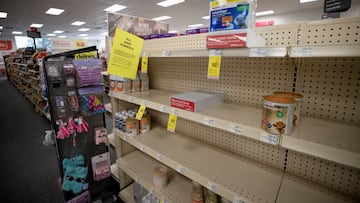What has the White House said about the baby formula shortage?
The White House outlines a few actions that will be taken to support families as a baby formula shortage hits the country.


Supply chain disruptions have caused many issues across various markets, but none compare to the stress caused by baby formula shortages across the country. Perigo CEO, Murray S. Kessler, believes that the shortage could last through the rest of this year.
One of the main contributing factors to the crisis is the low number of producers within the market. Four companies, Abbott Nutrition, Mead Johnson Nutrition, Nestle USA and Perrigo, control ninety percent of the baby formula supply.
Abbott, chose to shutdown a factory in Michigan afte the deaths of two infants were conected to bacteria found at the site. The Abbott shutdown has made a very fragile situation worse as other competitors struggle to increase production because of pandemic-related supply chain disruptions.
The White House has announced various steps today to support families with infants during this difficult time.
Online Support Portal
The Department of Health and Human Services (HSS) has launched an online portal with resources to help acquire formula during the supply crunch. Those struggling to find their baby’s formula can visit HHS.gov/formula.
One of the recommendations from HHS encourages parents to reach out to their pediatrician to see if they have any samples or guidance on where formula can be found. The webpage includes links to company resources and contact information for food banks that have been called upon to support families.
WIC and SNAP
WIC benefits help feed around half of all infants in the US. To ensure that those households can compete in the market, the White House has been working with the US Department of Agrulcutre (USDA) and major retailers to allow a broader range of baby formula brands to be purchased using WIC and SNAP benefits.
Press Secretary, Jen Psaki, told the media that the president had spoken with business leaders of major grocery and retail chains and urged “flexibility on WIC.” The CEOs responded that they would step up their efforts and that the WIC expanssion would help them “take steps, given the increased supply of these other manufacturers, to help stock the shelves more quickly.”
The USDA is offering three waivers to increase the flexibility of WIC benefits during the crisis. The majority of states have submitted all three waivers, providing families with much-needed support through this challenging time. The only state not to submit any is Illinois.
Waiver 1: Medical Documentation
Currently, states can continue to allow applicants to submit a claim to benefits without providing medical documentation. This is very important for parents with infants because, typically, only a few brands can be purchased using food assistance in each state.
Thirty-four states have passed this waiver giving parents greater options when on the hunt for an ever-shrinking supply of formula. Additionally, thirteen native American tribes and three territories have submitted the waiver.
Waiver 2: Maximum Allowances
As prices surge, some states have submitted a waiver that allows the maximum WIC and SNAP benefit to be increased. The White House has also called on the Federal Trade Commission to look into price gouging so the government can better tackle the issue.
This waiver is the least popular measure among the states.
Waiver 3: Expanded Brands
Many WIC recipients can only buy one brand of baby formula with their benefits. The third waiver offered by USDA expands the number of brands that can be purchased with WIC benefits, allowing parents greater flexibility in buying formulas.
Related stories
“This waiver helps allow WIC participants to be treated like all other customers during the 2022 Abbott recall of certain powder infant formula and exempt infant formula,” said the USDA when announcing the waiver.
When will supply return to normal?
During a press conference on Friday, Secretary Psaki noted that baby formula production over the last four weeks had surpassed the levels seen before the Abbott factory was shut down. However, getting these products to market with the continued supply chain issues, even domestically, is a challenge. The White House has been unable to provide a timeline for when the shortage could end.